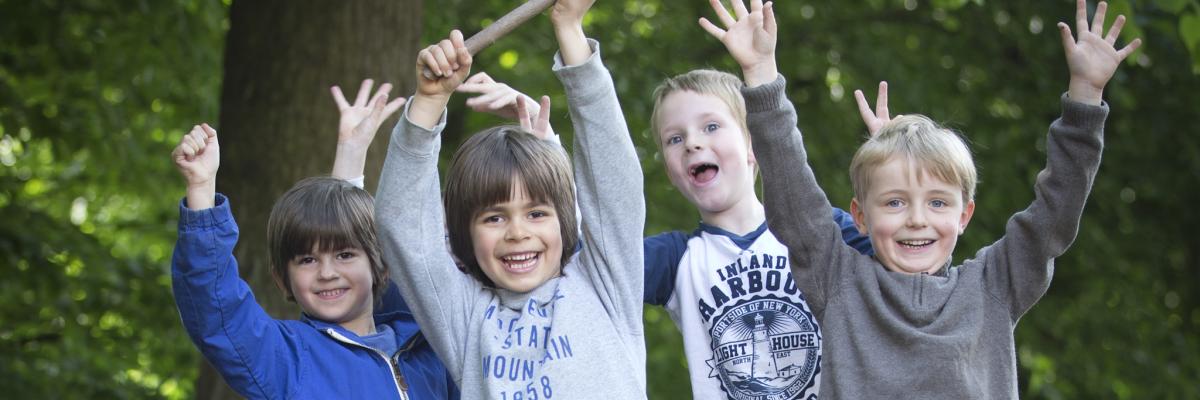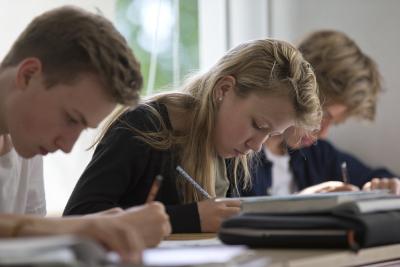
Pedagogy of Assumption
To educate always means allowing the good that is in every person to break through the rock which imprisons them and to lead it into the light where it can flower and shine forth. (Marie Eugenie)

The Assumption Sisters came to Denmark in 1908 and founded our school in 1909. Marie Eugenie was the foundress of the Assumption Sisters and lived in France from 1817 to 1898. In her society at the time, she saw all around her selfishness and materialism and she was convinced that this could be changed by education.
This gave birth to the Assumption philosophy of education with its forward looking vision and its roots in Jesus Christ and the Gospel. Inspired to look at the future with a dynamic view, Marie Eugenie's horizons were immense and open to the whole world. She sought passionately all in mankind that is of value and wished to impart all that is goodness, beauty and truth.
She believed:
To educate is to transform the world!
To educate is to liberate the human being.
What does this mean for us at Rygaards International School?
We believe
God created each of us in His image as brothers and sisters in one great family.
In practice
- Therefore every person, regardless of age, gender, race or religion, is of equal worth.
- All require the same respect, regardless of his/her position in the school. This is reflected in the way we treat each other and in the way we speak to each other.
- We promote positive language in all relationships and also in dealing with problems of behaviour.
We believe
God has made each individual unique.
In practice
- We give space for children to be creative, to think differently and to think out of the box. It means not being too prescriptive in the way we want a task carried out and completed, realizing that their way may be just as good, or if not, that they may learn much by experimenting with their ideas first.
- We help children to see that they are valued, that we all have different abilities that can be used for the common good. We help children to value each other and to be tolerant of differences of culture and opinion.
We believe
God has a plan and a purpose for each and every person and has given each one special gifts and talents to help them carry it out for their own personal happiness and for the good of the community.
In practice
- We believe all children have potential and we do our best to help children to realise it.
- We provide a varied and rigorous curriculum and monitor children’s progress through it, celebrating each individual’s achievements and helping each in his/her weak areas.
- We aim to help children to have a good self image, good self esteem and a purpose in life. By showing faith in them, they grow in faith in themselves.
- We help children find their particular gifts and talents and provide opportunities to use them and to encourage them to develop their gifts to the full.
- In group work, all children are given a specific role so all feel they have a part to play. Team work is encouraged. Here, leadership skills may also be developed.
- Through our Values programme, we focus on one value every half term in our assemblies, our circle time and throughout each lesson in our relationships with each other. The values give a good grounding to individual development.
We believe
God’s word tells us how we should all live together in a community of love and peace.
In practice
- An attitude of mutual love permeates all we are and all we do. Therefore, School rules are kept to a minimum as they all fall into “loving your neighbour as yourself.”
- Teachers, as role models, are seen to be fair and without favouritism.
- We help children to think of others and the community before themselves. This means putting the needs and wishes of the class and school before their own.
- We encourage children to look for the best in each other and to help each other to find the common ground when disputes happen and a consensus can’t be reached. We help children to work a way out of the conflict, to provide tools for dealing with situations that arise and teach patience and forgiveness.
- We uphold a set of traditions and ceremonies which bind us together as a community at Rygaards.
- We celebrate The School’s Birthday, Harvest, Fun Run Day, UN Day, Advent, Santa Lucia, Christmas, Fastelavn, Marie Eugenie Day, Lent, Easter, Theme Week, Sports’ Day, the Leavers’ Service and the Closing Ceremony.
- We celebrate Mass, Class Services and other ecumenical church services.
- We put on plays and musicals, hold concerts and go out on trips and outings.
We believe
God’s creation continues through us and the work of our hands. In this way we are responsible for all creation.
In practice
- We encourage children to think how they can take care of the environment by looking after the space around them, both at school and at home. For example, the school promotes the recycling of paper and children are reminded to put paper in the paper only bin. They are also encouraged to switch off taps and lights when not in use and not to waste paper and other resources.
- We invite guest speakers (often from among our parents) from the European Environmental Agency and other bodies to teach children about Climate Change and other environmental issues.
- In this way, we educate children to think about their role in society now and in the future and to be responsible for the resources they use.
We believe
With our sight set upon the broad horizon we play our part in accepting the responsibility to help making the world a better place in which to live.
In practice
- Through PSHE, we practise citizenship, working to make the community around us a better place for everyone. (Younger children learn to help as Class Monitors. Older children also have the opportunity to represent the class on the Student Council). We encourage children to look and see the needs of society in general
- We encourage children to have the strength of character to be true to themselves and their actions, that they rise above the negative influences of society and that they take a stand and a lead in helping others away from them.
- We encourage children to think of those in need and less fortunate than themselves. Each year, we join together in a Lenten Campaign to raise money for an Assumption School less fortunate than ourselves.
Conclusion
In all the above, we aim to teach children to be glad for every day, to see their unique purpose in it. This will give children an inner joy and a purpose for living life to the full as God intended.
This is our aim, as we send children who have had an Assumption Education out into the world. In this way, we hope to spread the love, peace and joy of Christ throughout the whole world.